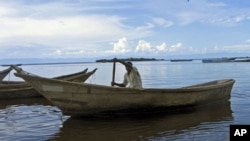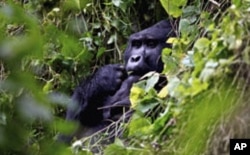Plans are underway to develop commercial oil reserves found in Uganda’s lush Albertine Rift, home of the rare Mountain Gorilla. Environmentalists are worried that oil fever and inadequate legal protections could jeopardize the area’s rich biodiversity.
The Albertine Rift is a paradisiacal place, a lush expanse of deep brush, forested mountains and spectacular, roaring waterfalls that runs through the heart of Central Africa. The Rift extends from Uganda’s Lake Albert to the southern tip of Lake Tanganyika. It is the only place on Earth where highly endangered Mountain Gorillas still roam. Along with gorillas, the Ugandan stretch is home to elephants, buffalo, nine national parks and four wildlife reserves. But in 2006, geologists discovered that the Albertine Rift was home to something else, as well. Oil.
With 2.5 billion barrels already confirmed, the oil in the Rift is expected to fuel an economic boom for Uganda, boosting revenues by as much as 30 percent and allowing the country to invest in things like transport, health and education. But environmentalists are concerned that in the rush to make money off oil, the Rift’s bountiful wildlife could suffer irreparable damage.
Crucial conservation region
Robert Ddamulira, an oil specialist at the World Wildlife Federation, describes the Albertine Rift as the most important conservation area on continental Africa. With 80 percent of the Rift already divided up into exploration blocks, he warns that nearly the entire area will be affected by the discovery of oil.
“Oil is a big boom business. In other words, even [with] activities taking place in the neighborhood, areas around will feel the impact in terms of increased human traffic, in terms of resource demand on the surrounding areas. So you can justifiably say that about 90 percent of the Albertine Rift will be affected either directly or indirectly,” said Ddamulira.
Land clearing, road construction, noise pollution from heavy machinery, and toxic chemicals seeping into the groundwater could damage the Rift's plant and animal life. He said that one of the biggest risks in Uganda, however, is that the oil production will begin before a structural framework is in place to protect the area’s delicate ecosystem.
“What we should be afraid of is that there are inadequate institutions, inadequate laws, and therefore you are running a business that is guided by profit only. If that’s the case that happens, then the big loser in all this will be the environment and the people that depend on it,” said Ddamulira.
Safeguarding nature amid oil extraction
He said the Albertine Rift also is home to some of the poorest communities in Uganda, many of whom subsist on fishing and hunting.
“Their livelihoods are intrinsically tied to the national resource conditions of the Rift. If oil poses a threat to those natural resources, it’s posing a direct threat to the sustainability, and to life as we know it for the local communities there,” he said.
But Naomi Karekaho, of Uganda’s National Environment Management Authority, said the government is taking steps to protect the Albertine Rift - also known as the Albertine Grabin. She said more legislation is being considered.
“Of course there’s no way you can have a refinery or oil exploration and production without constructing roads or putting pipeline for transporting it, but it’s going to be done in such a way that sensitive areas are avoided. One of the mitigations measures that have been put in place is to develop a sensitivity atlas that outlines the very sensitive areas within the Grabin that, no matter what, you should take care to avoid,” said Karekaho.
She admitted, though, that it would be difficult for oil production to bypass these sensitive areas.
“Some of it will be happening in those areas, but in the production areas it’s very little. It’s a very little head that’s put up, and it will not cause any problems to your wildlife or any other natural activities going on,” said Karekaho.
Ensuring smart, safe oil production
Although Uganda’s oil will make it one of the biggest petroleum producers on the continent, the reserves are expected to run out within 30 years. Most economists argue that to benefit in the long run, the country needs to invest in what is sustainable. This includes the national parks of the Albertine Rift, which bring in hundreds of millions of tourism dollars every year.
Ibrahim Kasiita, a business writer and oil expert, cautions against focusing on oil at the expense of the environment.
“You cannot measure the cost of the environment, so because of that, this oil should really be carefully exploited to ensure that the environment is well protected, because the environment is sustainable. Whereas this oil, as we say, 25 to 30 years - it’s nothing,” said Kasiita.
Ddamulira said that although Western-style environmentalism may not have taken off among ordinary Ugandans, that does not mean that people here do not care about the environment. For communities living in the Rift itself, he said, the environmental hazards of oil production could become a major concern in the next few years.
“Of course, the local person on the ground is more concerned about the day-to-day living, so he would like clean water, he would like productive land, he would like peace and harmony. They may not care about the environment as we know it, but they care about it because their livelihoods are intertwined with it. It’s their source of survival,” said Ddamulira.
Uganda hopes to begin commercial production of oil as early as next year. By that time, environmentalists hope, there will be enough regulations in place to protect the unique biodiversity of the Albertine Rift, as well as the people living there.





